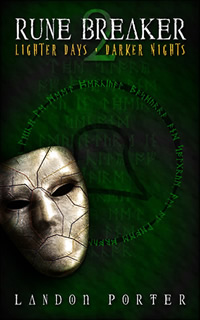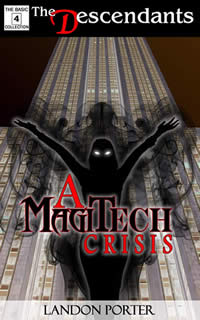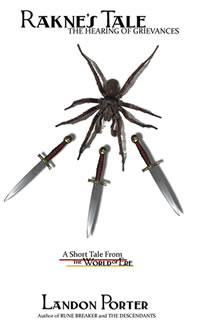If you count that time I tried to give out the first Descendants Collection for free only to be stymied by Amazon not letting me set it as free, I’m now early in my third year of publishing ebooks independently. It’s been an experience, though not one I’m either rueful nor nostalgic about. It’s nice to be able to pay for things with my writing (I bought a microwave in April! Also groceries—you guys have kept me in burritos for months now).
Over the course of the time I’ve been doing this, I’ve come to learn many strange, often counter-intuitive things about how the actual business of self-publishing works. Some of these things are so odd to me that I figure they might be interesting for you the readers to learn. Just be warned: seeing the business side of ebooks is a lot like finding out how sausage is made. Bring a barf bucket because I needed one when I found out:
There Is So Much More To Do Than Writing Books
…and you do it alone. So very, very alone. The key word in self-publishing is ‘self’ and it’s kind of serious about it. Taking a book from finished word-slab to ‘ebook’ involves a ton of stuff and if you don’t have a lot of money, or don’t know about the massive cottage industry that’s sprung up around self-publishing in the past few years, you have to do that crap yourself.
First of all, you see this:

That’s a book cover. And despite what everyone you have ever met will tell you as basic wisdom, literally everyone is going to judge your book by it. I got lucky here. My initial attempt at a cover was so horrifically pathetic that a forum friend of mine, graphic designer and comic artist Clay Kronke, took my initial concept (the sword and the flaer sigil) and made it beautiful just on a lark. He did the same for the cover of Lighter Days, Darker Nights, turning a poorly photoshopped theater mask into this:

Now keep in mind that most people don’t know unspeakably awesome and generous people like Clay and can’t be trained like a monkey to ape said style in photoshop. (as I did with the next two RB covers). For those people, they have to pay for their covers.
This can be in the form of a so-called ‘premade’ cover where there are graphic artists out there who are buying stock photos, photoshopping up generic covers for a given genre, then selling the result along with custom font work on the title and author name, to foll-blown illustrations of actual photoshoots with models.
A premade cover can set you back between $25 and $75 while a commissioned cover can cost hundreds of dollars.
But that’s not the worst of it. To even have an ebook at all, you have to format the book, which is essentially coding it into a special type of web page. I do this myself, with a program called Sigil, but not everyone is a coder, meaning yes, there are yet more people willing to format your book for $20 all the way up to $100 (!!!) dollars.
Oh! and you know how I’ve groused about needing an editor and started the Street Team (there are still slots open, btw. I just started sending them their free copies of ‘A MagiTech Crisis’) to help me deal with it? That’s actually called proofreading and that’ll cost you another 20-100 bucks—and then you get to editing, which is where an English major get sinto the nitty-gritty of your structure, continuity, and storytelling, oftne telling you to get rid of bits you the authr really liked because they feed on tears.
Also money. They feed on money. The cheapest actual editor I’ve every seen commanded $300 and that is DIRT cheap. $600 seems to be the average.
Most professional authors I’ve talked to say to expect to pay $1500 minimum to launch a book before advertising. For reference, I just had my best month ever and made $500 on my seven books. Now you see why I do how I do.
And oh yes, advertising. You have to do all your own marketing too, because of course you do. One would think that advertising would simply be a matter of throwing money at the problem and being done with it.
Like so.
Und yet…
Reviews Control How or Even IF You Get to Advertise
…And are the source of all angst and drama.
In theory, reviews on sites like Amazon are supposed to be for you the reader to make a more informed decision. For most products, this is likely still the case. For ebooks, it has become a warzone where many writers live or die, often in blazing roman candles of hate and pain.
You see, these days literally anybody can publish their book on a ton of stores and they all want to throw money at whoever can get their link out in front of readers. However, there are only a few sites that are really good at this, in particular, the kingmaker of such sites, BookBub. Getting an add there essentially launches careers so naturally everyone wants in on that.
Just as naturally, BookBub wants to root out the crappy ‘I slapped this together to get rich’ book from stuff their readers would enjoy. Unfortunately, they and many other sites do this by requiring a book up for their advertising slots have a certain number of reviews on Amazon with a certain average of stars (4.0 mostly).
If you are unfamiliar with Amazon’s reviews, anyone can give them for any reason and it’s not entirely clear what the stars mean. Amazon registers 3 stars as bad, for example despite it being good everywhere else.
So you have a shiny brass ring that can elevate you into your dream job almost instantly… and your ability to reach it is dependent on strangers not just liking but loving your work—the work you can’t advertise wel at all without having a bunch of reviews already. I’m sure some of you can see where this is going.
Yup. Bedlam.
Oh how many ways has this thing gone wrong. First of all, there are of course people out there now selling reviews and therefore people buying reviews. Like a shitton of reviews. So Amazon, being a big, dumb corporation, started purging reviews—pretty much blindly because of course they did. So a lot of people lost a lot of real reviews and are no longer able to, or that much farther away from advertising effectively. Hooray!
Oh, but it gets better. Authors no need to be absolutely adored by their readers at least enough to average a 4 out of 5 stars. This means that every 1 or 2 star review is crippling and even 3 star reviews can hurt. So now they pay attention to those reviews. And obsess. And go mad.
From honest confusion over oddly worded or vague reviews to outright panic over ne person not liking the genre and punishing everyone who writes it, to ADAMANTIUM RAAAGE (I haven’t linked to Linkara in a while, so sue me) over someone’s honest, constructive criticism, it runs the gauntlet because reviews are now vitally important to authors in all the wrong ways.
And where there is someone who finds something important, there are trolls and opportunistic jackasses who will use this as a greifing vector. And you know what that means?
No, Not awesome rock/rap fusion. Sabotage. There are people out there you can literally hire to give one-star reviews to books in your category. Not only that, but on some forum disagreements by going to give you book one-stars as ‘punishment’. And then yes, there are people who will look up a book, find that it’s, for example, Horror, then give the book one star for being Horror because… justice? I have no idea.
It’s a terrible system and it’s made everyone’s lives and jobs worse.And the ‘making everyone’s jobs worse’ thing is impressive when you realize…
There Are No Industry Standards
When you buy a print book, it will in general be printed on paper, have a copyright page up front with the first chapter and the page numbering starting on a right-hand page. Those pages will contain 300 words per page on average and after the end of the story, there will be some trade material such as previews for new books, an ‘about the author’ section, and stuff like that.
When you get an ebook, the pages will be in order… and that’s the only thing you can reasonably expect. Everything else is up to the author and/or the place you bought the book from.
Over on Amazon, you’ll be getting your book in the (in my opinion inferior) .MOBI format, which is an Amazon proprietary format for their Kindle device. Most other places take the common .EPUB format buuuut some are more permissive about how you format the book than others with Apple being the pickiest on top of not allowing you to even mention books or sites where people can buy things not by Apple. And finally, some places still use the old stand-by, the .PDF file.
On top of this, no one makes you put in a title page or copyright pages and because places like Amazon offer previews of X number of pages from the front of the book, many writers just leave them out. They leave back matter out too because ereaders can’t distinguish between the story and other pages, meaning stuff in the back of the book makes the little thing that tells you how much of the book you have left to read report incorrectly. So you will often get literally just the book with maybe a link (that statistically you will NEVER follow) to extras embedded at the end.
Plus a note begging you for a review because again, reviews are the most important thing evar now.
This might or might not matter to you as a reader (it does to me because I decide what to buy next from those previews publishers like Tor stuff in their books), but it is, again, a source of much angst on the other side of the keyboard. For one thing, if you want to sell your books from as many places as possible (hey, remember when some of you wanted the Descendants books on Kobo and I couldn’t do it because I was on Amazon Select? Ugh.), you’re going to have to format the book for each of those three formats, plus a Jealous Corporate Titan Edition for Apple’s cult ass, plus another super-special edition with the words ‘Smashwords Edition’ n the front matter if youw ant to use the site Smashwords to sell your book.
This takes time and effort keeping track of these things—and if you hired a guy to format stuff, it also costs money.
Oh, and be ready to change all that because…
You Are At Everyone’s Mercy
Last year, some digital tabloid called the Kernel made a horrific discovery: People were selling books with sex in them online (specifically the Kobo ebook store)! Shock and horror! And some of it was kinky sex.
British book giant WH Smith happens to use Kobo as its online bookstore and totally understandably—flipped its shit over this sexifiedness going on, closing down its entire booksstore. Naturally, Kobo responded with a measured and reasoned reaction by PULLING EVERY SINGLE SELF-PUBLISHED EBOOK IN THEIR STORE. This would include Rune Breaker, where the only penetration is done with swords and appropriately transformed limbs and the results are honest, American fountains of gore instead of dirty, communist positive feelings of intimacy.
It took me until February of this year, some four months after the fact, to get my books reinstated—and there was nothing I could do about it because due to how the services are set up with these companies, self-publishers have no rights.
See, all these platforms; Amazon, Koko, Barnes and Noble… they all have a very basic contract you agree to in order to get your books online. And in that contract, they always include a) the ability to make changes to the contract at any time and b) the ability to terminate your contract at any time for any reason with minimal warning. I may be getting 70% of the profits from my books to a traditionally published author’s 25% at best, but they get something I will never be allowed: dignity. Okay, that’s a lie no writer has dignity. They get to negotiate their contracts though and no one is pulling Steven King’s books because some other dude published by that company made a book about incest.
It doesn’t just end there though. Amazon is lazy and dumb (don’t say that to a lot of self-pubbers or they will burn you for a witch, by the way) and won’t put an option to opt in or out of adult content on their site. However, they really, REALLY want all the money they get from books about sex with dinosaurs and the like, so they’re not just going to stop accepting sexy books. Nope, they’ll just make books deemed too sexy invisible to searches, something erotica authors have dubbed ‘the adult dungeon. To be clear, they don’t tell you if your book is in the dungeon, your sales just tank because no one can find your works. They also won’t tell you exactly what is too sexy about your book, just eventually sending a letter saying to change all the sexiness or your book will be deleted.
But we’re just getting started. Amazon also demands that you never price you book lower on another site (unless it’s priced free). Fine. Whatever. Buuut, then if you’re on Google’s book site, GooglePlay, they reserve the right to discount your books whenever they want and will in fact discount your book the instant you put it up. Does Amazon know or care that it’s Google, not you that changed the price? Of course not. Prepare for an angry email threatening you for not following your contract.
Any of them can change how much your royalty is tomorrow and you’ll just have to suck it up. Or they can change the contract entirely and legally only have to send you a ‘HAW HAW’ email. Oh and of course, if they ban your account (again, for any reason) they of course heroically keep the money you earned for that month.
It’s not just your sales channels that can screw with you though. Stock Photo sites change their terms of service from time to time and the trend is towards making ebook covers cost more because so many ebook authors use stock photos. There have also been times where photographers, misunderstanding their own contracts with said sites, have harassed authors who used their stock photo work.
Price fluctuations are a way of life too. Formatters, advertising sites and editors usually enter the industry with low (read: reasonable) prices then quickly realize that they have a captive audience and prices multiple quickly.
You have more control by doing this stuff yourself, but it’s a lot more work and time on your part—time where you aren’t writing. Those of you wondering why I haven’t updated my fanfics in a few months? Yeah, it’s mostly due to working on covers and crap—I spent two weeks searching for a Creative Commons commercial free image of a spider for one cover.
Which leads me to the last thing…
You Will Have To Become a Massive Shill For Your Work
As mentioned, most writers are alone except for what they can throw money at and getting actual ads requires you to have a decent amount of readers to start with.
So how do you make all the sales and get all the reviews you need to make actual sales and get reviews?
You never. Shut. Up. Seriously, there are many places online that don’t allow writers in because they’ll keep trying to sell their book. And oh god, my twitter feed is full of spam because I follow a bunch of fellow authors.
It’s a good thing I’m nothing like that.

Who put that there?!
It’s not like the 4th Descendants book, A MagiTech Crisis is going to be coming out as soon as I get the corrections back from the Street Team.

What the?!
Well that’s weird. The first Rune Breaker spin0ff short story, Rakne’s Tale: Hearing of Grievances is coming out next Friday, but I have no idea why that’s here.
It’s weird really. It’s almost like this whole post was a set-up for mindless self-promotion. How can that beeee?





Mindless self promotion? You? Never!
That’s what I thought too. And yet here we are :p
Well, if nothing else this made me feel slightly less bad for never having written a book.
To paraphrase/borrow from one of the greats:
“I am shocked, shocked to find self-promotion going on on this website!”
“Your royalties, sir.”
“Thank you very much!”
Indeed. *pockets royalties*
Out of curiosity, which platform do you prefer for selling books?
All of them. You really need to spread yourself out to allay that ‘at everyone’s mercy’ thing.
Best sales was Amazon until the last two months, now it’s Barnes and Noble for me.
Best platform to u is DriveThru Fiction. They treat authors really well and have tons of awesome tools to reach readers and provide better service and products. It’s a shame they’re not a bigger player.